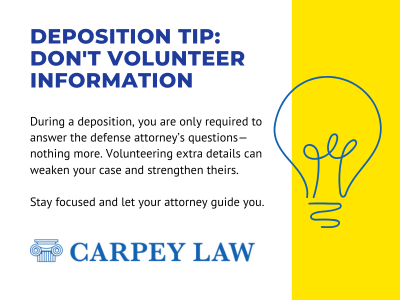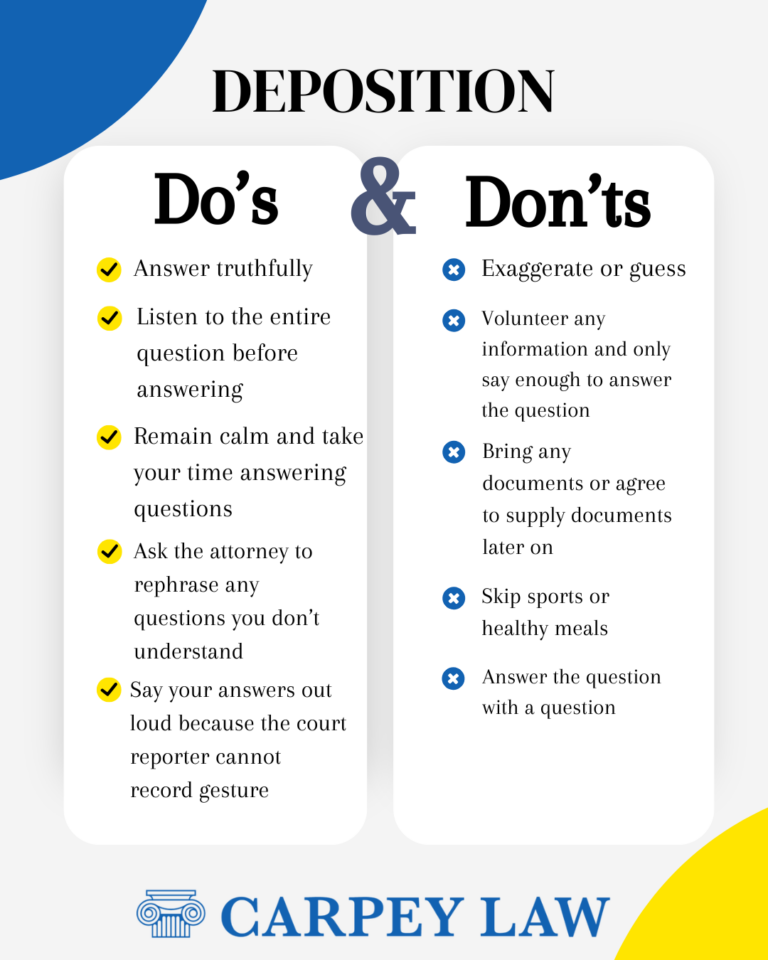A deposition is the defense attorney’s opportunity to question you about your case. The defense attorney can pose questions about the circumstances of your accident, the severity of your injuries, and your medical treatment.
When Does The Deposition Happen?
 Depositions happen after a lawsuit is filed, and during the discovery process of the case, The defendant’s attorney will send you (through your attorney) a legal notice of deposition. It is mandatory that you have to submit a deposition after receiving the notice. Depositions are an important part of your case and are part of the “discovery” process of your personal injury case during which time the lawyers for each side gather information about the case.
Depositions happen after a lawsuit is filed, and during the discovery process of the case, The defendant’s attorney will send you (through your attorney) a legal notice of deposition. It is mandatory that you have to submit a deposition after receiving the notice. Depositions are an important part of your case and are part of the “discovery” process of your personal injury case during which time the lawyers for each side gather information about the case.
Generally, depositions take place in your lawyer’s office, not in the courtroom, in the presence of your lawyer, the opposing party’s attorney, and a court reporter.
At Carper Law we thoroughly prepare you for the questions that may be asked of you during your deposition. Contact us today to schedule a free consultation.
The basic “rules” of how you should conduct yourself as a witness at a deposition include:
- Recognizing that a deposition is not a conversation; it is a formal legal proceeding
- Be precise in your answers
- Keep your answers short
- Never guess
- Do not get angry
- Do not get upset because you do not like the questions being asked
Depositions can be stressful under the best of circumstances. Remember to always be calm and respectful to the lawyer asking the questions.
Preparing For A Deposition In A Personal Injury Case
Preparing for a deposition in a personal injury case requires careful review of your case details, coordination with your attorney, and practice in providing clear, honest responses. Expect questions about the accident, your injuries, medical treatment, and how the injury has affected your life. It’s crucial to listen carefully, answer only what is asked, and avoid speculation or exaggeration.
A qualified attorney should always spend the time preparing their client for the deposition process. Having an experienced attorney with you during your deposition is imperative as is the pre-deposition preparation. In that preparation, your lawyer should explain that you are required to answer any question the other lawyer may ask regardless of how silly or irrelevant it may seem. Sometimes, those types of questions are just used to gauge how you, the witness, will respond. If a question is truly out of bounds, your lawyer can object and give you an instruction not to answer a question.
Dos And Don’ts For Your Deposition Process
Chances are you’ve never been a part of a deposition before, and they can be a little intimidating. So, what can you expect? What should you do? What are the right things to say, and what should you avoid?
Here are a few of the basic instructions most personal injury attorneys should give to their clients in preparation for deposition testimony.

-
Depositions are not conversations. Depositions are formal, legal proceedings. Be polite. If there is no question being asked of you, don’t say anything.
-
Be truthful. If the defense attorney feels you were not forthright in answers to any question you can be guaranteed he or she will use this against you at trial.
-
Be as precise as you can. Specificity is key.
-
Think before you answer. Make sure you understand the question. If you do not understand the question, ask for a clarification.
-
Do not volunteer information. Keep your answers short. When you give lengthy answers, you may reveal more information than you should, potentially giving the Defendant’s attorney ideas for more questions.
-
Never guess. You might be wrong. If you don’t know the answer, say you do not know. It is better to say nothing than to guess.
-
Do not get angry. Becoming angry sometimes will make you reveal too much information, and will send the message that you are ill-prepared to be a witness and cannot control yourself. The attorney for the other side will try to take advantage of that weakness at trial.
-
Stop talking when your attorney objects. Some questions are completely improper and should never get an answer.
-
Completely review any documents or photographs before answering questions about them. In other words, your attorney and you can look at anything the defense attorney presents you during the deposition before you try to answer questions about the document(s).
Which Types Of Questions Can Be Asked In Your Deposition?
During deposition, the opposing attorney will ask you various questions in the presence of your attorney and court reporter. The court reporter records your answers in a transcript. Although the questions can be anything about the case or yourself, you can prepare for deposition with the help of your personal injury lawyer. Generally, you can expect questions about the following:
- Questions about your personal information such as your work, ID, family, background, etc.
- Questions about the accident, etc.
- Questions about your interactions or phone calls with others immediately after the accident, what were the conversations, etc.
- Questions about your medical health, life, medical tests after the accident, etc.
- Questions about your health and life before the accident, etc.
- Questions about your injury, treatment, etc.
Why is a Deposition Important for Your Case?
Now, we know this is a lot of information to take in. We also know that the idea of giving a deposition can be stressful for many people. That is why we spend time preparing ourselves in advance of a deposition. Check out Stuart video’s on what a deposition is and why it is important for your case.
Personal Injury Settlement After Deposition
After deposition in a personal injury case, both parties evaluate the testimony and evidence to determine the strength of the case. The defendant’s insurance company may offer a settlement based on the details revealed, including the extent of injuries, liability, and potential trial risks. If negotiations are successful, a settlement can be reached without going to court. If not, the case may proceed to trial.
Depositions are important for your personal injury case because –
- They are an opportunity for you to testify on record and preserve your side of the story.
- They also give the lawyers an opportunity to gather information, facts, and assess the case.
- They provide an opportunity to evaluate the strengths and weaknesses of the case.
- Depositions can lead the lawyers to different evidence and proof.
- Witnesses for your case also undergo depositions. Witness testimonials given during deposition have a written record that can be presented in court.
Download A FREE Transcript Of A Deposition
To help you get an idea of what not to do in a deposition, we are sharing the transcript of a deposition. In this deposition, one of our clients was testifying about how she fell and how she was injured. Unfortunately, our client was not very clear in her descriptions. Although we were still able to successfully settle this case, our client’s deposition did not help her cause. Again, her mistake was that she was not specific in her answers. This had an impact on the defense attorney’s evaluation of her as a witness. This serves to show that it is always best to provide distinct and clear answers to questions in a truthful and well-considered way.

Stuart A. Carpey, who has been practicing as an attorney since 1987, focuses his practice on complex civil litigation which includes representing injured individuals in a vast array of personal injury cases.

